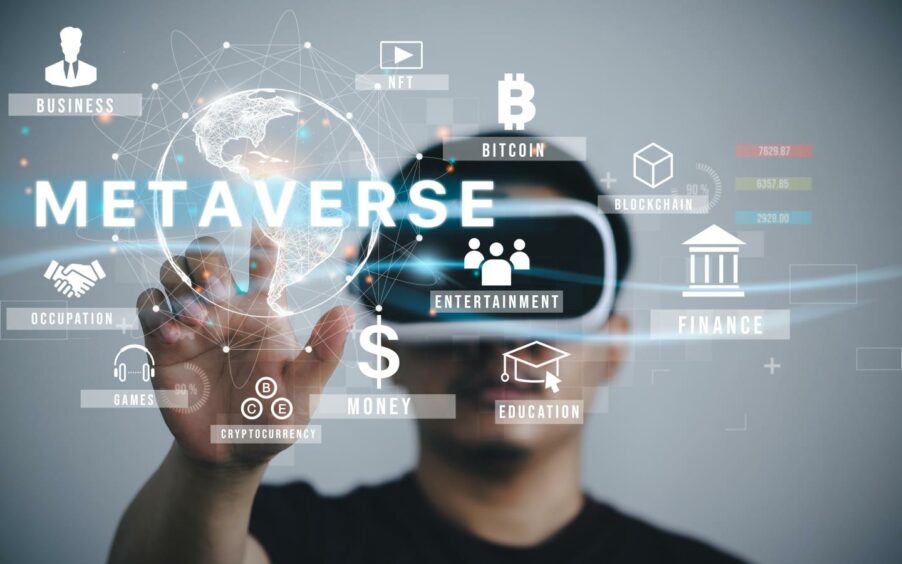Peter Ranscombe straps on his virtual reality goggles to explore how businesses in the north and north-east can take their first tentative forays into a developing online world.
Virtual reality (VR) has been a mainstay of science fiction for decades.
Whether it’s Neo and co immersing themselves in The Matrix, Steven Spielberg bringing The Oasis to life in Ready Player One, or Lister and his Red Dwarf crewmates becoming trapped in Better Than Life, there’s no shortage of alternate worlds in books and films, or on TV.
But if technology giants like Mark Zuckerberg’s Facebook get their way, VR could soon become a business reality for Scottish companies.
Welcome to the “metaverse”, an online world that takes VR to a new level.
In the past VR was a tool for one-off encounters, from playing games to viewing plans for buildings.
The metaverse – as its “beyond” or “transcending” prefix suggests – goes a step further; instead of simply using VR for individual activities, headsets give access to an online “universe” where users visit landmarks, watch concerts, or meet online versions – or avatars – of their real world friends.
Scottish singer Nina Nesbitt, who performed at a metaverse concert, likened having her avatar created to playing classic 1990s video game The Sims and its three later editions.
Many consumers already live online by endlessly scrolling through their social media feeds, or booking takeaways, taxis, and tourism through apps.
The metaverse is billed as a more immersive version of the internet where users can live a second life.
It won’t be controlled by a single company or platform, just as the internet isn’t run by a single business.
And, while at first glance the metaverse may appear to be just the latest craze for online gamers or social media-addicted teenagers, sectors including tourism and retail are already exploring its potential.
Sending postcards from your metaverse holiday
New Frontier, a Carnoustie-based consultancy, ran a webinar last month for fellow Association of Scottish Visitor Attractions (ASVA) members to highlight business opportunities.
“The metaverse will complement the experience of actually visiting Scotland, rather than replace it, but it can also provide opportunities for experiences when visiting in person is not possible,” explained New Frontier director Graeme Stevens.
He added: “A good example is the metaverse showcase of the Australian Open – I was able to go onto the ‘virtual’ court in the Rod Laver Arena, have a game of tennis, browse avatar wearables for sale in the shop and visit the Open park, where I could ride a Melbourne Eye and see a view of Melbourne Park.”
Mr Stevens pointed to examples like Barbados, which opened a virtual embassy to promote holidays, and South Korea, which is creating digital versions of Seoul’s three biggest tourist attractions, while Disney is linking digital treasure hunts into its theme parks.
He said: “26% of visitors want a virtual experience, in the majority of cases, as a way of exploring a destination before a visit.
“This ‘try-before-you-fly’ demand is only likely to increase as we see the generational differences between millennials, Generation Z, and Generation A showing.”
Mr Stevens added: “With the help of The Great Tapestry of Scotland (attraction in the Scottish Borders), Traveltech for Scotland (Edinburgh) and ASVA, we are developing a ‘metaverse playbook’ for the tourism sector.
“This will act as a guide and toolkit to support anyone in the tourism sector to take their first steps to understand the technology.”
Tourism bodies watching developments closely
Joshua Ryan-Saha, director of TravelTech for Scotland, which supports technology firms working in tourism, said: “It’s important for tech companies to work together with tourism businesses to test out ideas for the metaverse.
“It’s not just about the technology that will be used today, but also what we need to develop for the next five or 10 years.
“It also raises questions about whether the VR experience will be so good in 10 or 20 years that people will feel they don’t need to come to Scotland, so we need to explore how tourism businesses can still make money.”
ASVA chief executive Gordon Morrison said: “The metaverse opens up a number of potential income streams to tourism businesses and, with the vast majority of the sector facing-up to large financial black holes caused by the pandemic, there is considerable interest in exploring any means to generate income and provide an enhanced experience for visitors.
“A virtual visit will never succeed in replicating the quality or immersive aspects of an ‘in-real-life’ experience but capitalising on the metaverse allows attractions to increase accessibility considerably.”
VisitScotland introduced a virtual tour in 2017, but it’s no longer promoted.
A spokesman for the national tourism marketing agency said: “Although we have no immediate planned marketing activities in the metaverse, or any other alternative reality, it is something we are becoming increasingly aware of.
“We are looking closely at how this develops and evolves in terms of trends to consider.
“We are also looking to learn lessons from bigger brands that are early adopters in this space.”
Taking online shopping to the next level
During a recent webinar, Michelle Evans, retail and digital consumer global lead at analysis firm Euromonitor International, said the number of people using VR or augmented reality to shop for household items or furniture, or to visualise how clothes would fit, rose during the pandemic lockdowns.
Ms Evans said that in the past consumers used websites for simple transactions, while still visiting physical stores to browse and “truly shop”.
As e-commerce expands consumers will be going online not just to execute purchases but to “shop” as well, she added.
Ms Evans pointed to companies already moving beyond simply promoting their brands in the metaverse to actually selling goods, including Nike, which created “Nikeland” on gaming platform Roblox, and fashion brands Dior, Gucci, and Ralph Lauren using Zepeto, Asia’s busiest metaverse platform.
Mr Stevens from New Frontiers thinks there’s potential to sell virtual kilts.
“If I buy a kilt, I could scan a quick response code to receive a token of my kilt to use with my avatar,” he said.
As well as virtual clothing and accessories, brands are also selling beauty products for customers’ avatars.
Emma Chiu, global director of Wunderman Thompson Intelligence, said: “The major players involved in rolling out meta beauty are larger brands such as Nars Cosmetics and Gucci, but this is not a space exclusive for big players.
“What beauty can look like in the metaverse is still an open forum for the industry to define and evolve.
“It’s definitely worth it for smaller brands to participate, although the financial return may not be immediate.”






